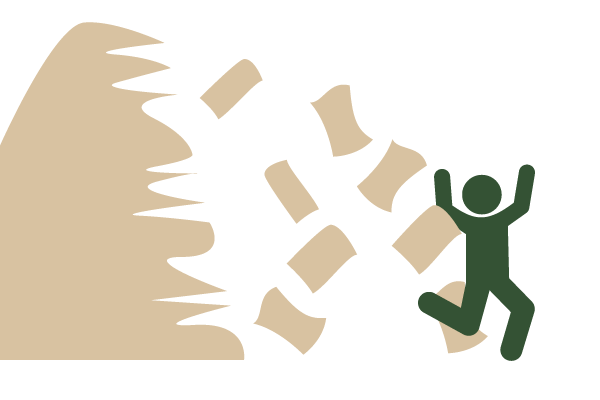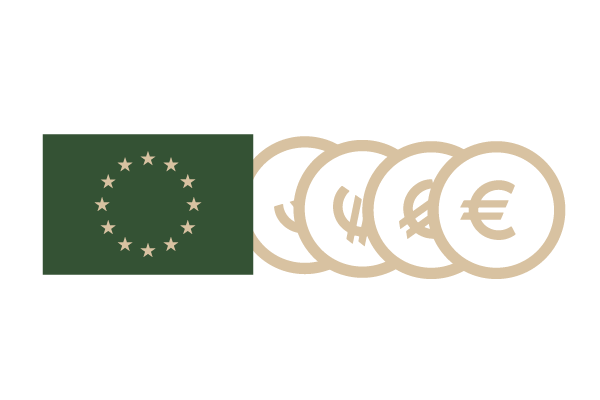 “The EUDR means a mountain of paperwork"Reality: The EU has been working hard to streamline the procedures
“The EUDR means a mountain of paperwork"Reality: The EU has been working hard to streamline the proceduresTaking onboard feedback from companies and governments around the world, the EU has proposed several improvements in 2025. The simplified procedures, including lower risk categories, aim to reduce administrative burden by around 30%.
Find out more in the updated guidance and Frequently Asked Questions.
 "The EUDR is a trade ban"Reality: No country nor commodity will be banned.
"The EUDR is a trade ban"Reality: No country nor commodity will be banned.Products from all countries, including those with a high-risk level, can continue to be sold in the EU, as long as the company follows the correct process to prove they are deforestation-free.
Companies will have to prove their products are from deforestation-free supply chains - which can create an opportunity for them in terms of access to the EU market, boost consumer confidence, and guarantee the sustainability of their supply chains in the long term.
 “The EUDR is a death sentence for competitiveness.”Reality: Companies that comply can benefit from a booming global market.
“The EUDR is a death sentence for competitiveness.”Reality: Companies that comply can benefit from a booming global market.The market for sustainable products is growing. EUDR opens up opportunities for companies offering deforestation-free products and encourages producing countries to further develop their offer.
The regulation applies to all companies selling products in the EU, so it creates a level playing field with high standards of environmental protection.
 "The country risk classification is unfair and outdated"Reality: The country classification is based on the latest and most accurate scientific evidence available
"The country risk classification is unfair and outdated"Reality: The country classification is based on the latest and most accurate scientific evidence availableThe classification uses the Global Forest Resources Assessment by the Food and Agriculture Organization of the United Nations, which is recognized internationally and is updated every five years.
The country classification uses the latest available data, which is from 2020, and will be reviewed when new data becomes available.
 "The EU hasn’t been listening to concerns about the EUDR"Reality: The European Commission took onboard 1.2 Million comments from around the world
"The EU hasn’t been listening to concerns about the EUDR"Reality: The European Commission took onboard 1.2 Million comments from around the worldBefore drafting the law in 2020, a public consultation allowed anyone, including companies and countries outside the EU, to share their comments and concerns.
Since then, the Commission has continued to actively engage with stakeholders and governments, individually and through multilateral forums, organising over 400 meetings with stakeholders in 2024 alone.
Global cooperation is the cornerstone of the fight against deforestation.
 “The EUDR increases coffee and cacao prices”Reality: Prices are mainly affected by climate change and rising labour and energy costs
“The EUDR increases coffee and cacao prices”Reality: Prices are mainly affected by climate change and rising labour and energy costsIncreased drought and the spreading of disease are already reducing yields and, in the long term, are threatening the suitability of key production regions. These pressures lead to a price boom driven by increasing global demand.
Taking action against deforestation is vital to fight climate change.
The cost of complying with the EUDR is negligible compared to these factors.
 “The EUDR will harm small farmers in developing countries"Reality: No legal obligations for smallholders outside the EU, and several benefits
“The EUDR will harm small farmers in developing countries"Reality: No legal obligations for smallholders outside the EU, and several benefitsMost of the obligations under the EUDR apply to companies placing products on the EU market, for instance the importer, and not to farmers that do not directly sell their products in the EU.
Producers will just need to provide the location (geolocation data) of the land where their products come from. This can be done once, using a smartphone.
The EUDR can give farmers a stronger and more independent position in the value chain, by clearly establishing the origin of their products. This can mean fairer prices, higher incomes and new business opportunities.
 "Due diligence is difficult and complicated"Reality: an online system makes it simple to manage due diligence
"Due diligence is difficult and complicated"Reality: an online system makes it simple to manage due diligenceDue diligence statements are submitted electronically in the EU digital database (Information System). These statements will be checked in the registry and by Member States' authorities.
Submitting due diligence statements with geolocation is the easiest way to prove a product is deforestation-free.
The Information System is designed to reduce administrative burden and increase efficiency.
Customs authorities, governments and large companies can connect to it directly.
The system includes many features to avoid the need for repeated inputting of data.
 “The EUDR is an SME killerˮReality: Several provisions make it easier for SME's to comply
“The EUDR is an SME killerˮReality: Several provisions make it easier for SME's to complyDid you know? SMEs under EUDR:
- Are exempted from annual reporting obligations
- Enjoy lighter requirements in terms of risk mitigation
- Downstream SME’s do not need to carry out due diligence or file statements for products that have already been subject to due diligence further up the supply chain
- Micro- and small businesses have 6 extra months before the rules apply
- SME’s in the wood sector were already subject to the EU Timber Regulation and have therefore been dealing with due diligence obligations for more than a decade
 “Border checks for EUDR compliance will disrupt trade”Reality: Checking that a product is deforestation-free does not block it nor cause delays
“Border checks for EUDR compliance will disrupt trade”Reality: Checking that a product is deforestation-free does not block it nor cause delaysNo delays will occur and no compliant product will be blocked, as long as the company has met it's obligations before placing a product on the EU market or exporting it. Customs authorities will check that customs declarations include a valid Due Diligence Statement reference number, showing that a DDS has been submitted online.
Other checks may take place before or after a product is exported or imported and will therefore not cause delays during customs procedures.

